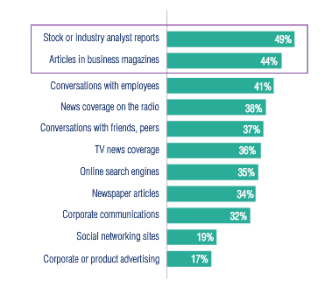Top cop Ali Dizaei is now a disgraced officer languishing in jail. His conviction for perverting the course of justice has raised the whole issue of who can we trust. If we can’t trust senior police officers, who can we trust? In short, of course, there are a few police officers who are untrustworthy, but there are also a few surgeons you can’t trust and a few airline pilots who are not up to much either. In other words, most of us can be trusted but in every group there are individuals who breach the rules and cannot be trusted.

The Dizaei imprisonment coincides with an interesting BBC experiment which also exposes the issue of trust. Reporter Stephen Chittenden is currently only receiving his news via places like Twitter or Facebook. He has shunned traditional media in a bid to see if it is possible to keep up-to-date with what is going on in the world. The experiment follows an article in the Huffington Post discussing the notion that we no longer need to go to newspapers, radio or TV for news because thanks to social media “if the news is that important it will find me“. But, as Stephen Chittenden said in his update this morning on BBC Radio Five Live, he doesn’t know if the news he gets (mostly via Twitter) is actually true. Can he trust the army of online reporters in the same way he can trust a traditional news organisation?
So, now we don’t know if we can trust senior police officers and we don’t know if we can trust the news snippets we get from Twitter. Is there any truth any more?
Well according to the latest annual survey of trust from the PR company, Edelman, we simply don’t trust social networks for real information. According to their study, social media is on a par with advertising, which is thought to be biased. Overall – in almost every sector – trust has plummeted from the same survey done a year ago. In fact, according to this study, we even trust our friends only half as much as we did a year ago. But can you even trust this study?
It has been reported widely on several respected sites as though it were “fact”. Other sites, like HubSpot, have tried to analyse the information and have come up with some good ideas as to why trust may have fallen in social media. And therein lies the truth about how we measure trust.
When you meet people in the flesh you analyse loads of information simultaneously – tone of voice, eye contact, facial expressions, appearance – and then add that to the databank of information you already have about that individual. This might include what other people have told you about them, or the stereotype you hold for such a person. You then make an assessment and you might find yourself saying “I’m not sure…there’s something about him that’s not quite right”. The various sources of information don’t combine in the right way to enable you to fully trust them.
The same is true online – except that we don’t have the non-verbals to help us. So we need to use other analytical skills. That means, when we receive news via places like Twitter we may check a link or two to see where it is from; we may email people to find out what they think. What we are doing is trying to gather a set of data that helps us work out whether the material can be trusted. We analyse things more.
And if you analyse the Edelman data you find that it is based on a specific sample primed to talk about trust. The people in the study had to meet specific criteria and be relatively high earners, with high levels of education and high consumers of news. In other words, a non-representative sample. Then you take that educated, news-savvy bunch and you prime them by conducting a survey on trust. Now what results would you expect from that? The chances are they would question trust themselves, because they are likely to be analytical individuals themselves.
So, the Edelman study doesn’t tell us that trust in social media is low and falling. What it tells us is that if you take a subset of people and prime them to talk about trust there is a chance they will question trust anyway. The results are unsurprising.
But do you see what I have done here? I have had to analyse the online information I have received. And that’s what the BBC experiment on “social news” is likely to find; we can get all our news from Twitter and Facebook, but in order to be sure of it we will analyse it more, check it more and see what other people are saying about it. In other words we will be doing what we do “in the flesh” getting a brainload of information so we can work out what we trust. And if you don’t check everything you read online – including this article – then there is a chance what you read is untrustworthy. Do you believe me?
